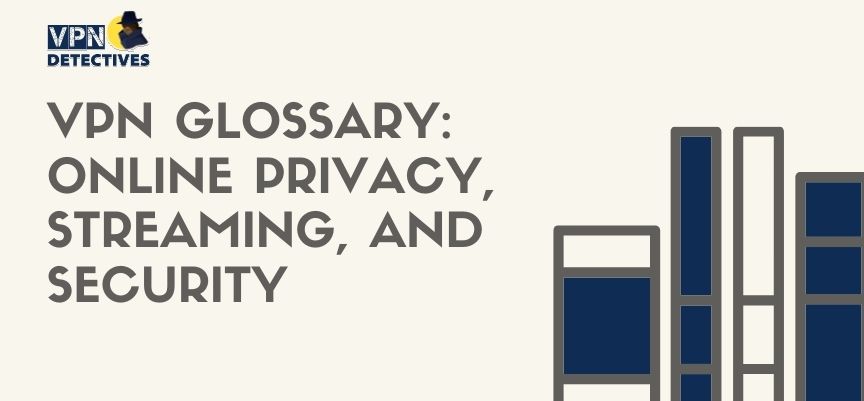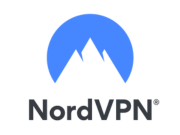Table of Contents
VPN Glossary: Essential Terms for Online Privacy, Streaming, and Security
•
Updated on 5th February 2025

1. VPN-Related Terms
- VPN (Virtual Private Network): A service that encrypts your internet traffic and masks your IP address, making online activities more private and secure.
- VPN Tunneling: The process of creating a secure, encrypted connection between the user’s device and a VPN server, ensuring privacy and security of data.
- Encryption: The process of converting data into a code to prevent unauthorized access. Often used in VPNs to protect user data.
- AES (Advanced Encryption Standard): A widely used encryption algorithm, often offered by VPN services for securing internet traffic. Comes in different key sizes, typically AES-128 and AES-256.
- IP Address (Internet Protocol Address): A unique identifier for each device connected to a network. VPNs mask your real IP address to improve privacy.
- Kill Switch: A feature that automatically disconnects your internet if the VPN connection drops, ensuring no data is transmitted outside the VPN tunnel.
- Double VPN: A feature that routes your traffic through two different VPN servers for additional layers of security and privacy.
- Obfuscated Servers: VPN servers that disguise VPN traffic as regular internet traffic to bypass restrictions like government censorship or network firewalls.
- DNS Leak: When DNS requests are sent outside the VPN tunnel, potentially exposing your real location or browsing history.
- Split Tunneling: A feature that allows you to route some internet traffic through the VPN while other traffic uses the regular connection.
- Zero-Log Policy: A privacy policy where the VPN provider does not store any of your personal or usage data, ensuring greater anonymity.
- IP Spoofing: Masking the real IP address and pretending to be in a different location, often used to bypass geo-blocking or restrictions.
- VPN Protocols: Different methods of establishing a secure VPN connection, such as OpenVPN, IKEv2, WireGuard, and more. Each offers different levels of speed, security, and compatibility.
- IPsec (Internet Protocol Security): A suite of protocols used to secure IP communications by authenticating and encrypting each IP packet in a communication session. Often used in conjunction with VPNs for securing data.
- L2TP/IPsec (Layer 2 Tunneling Protocol): A VPN protocol often paired with IPsec to provide stronger encryption than PPTP. Commonly used by businesses.
- WireGuard: A newer, highly efficient and faster VPN protocol designed to be simpler and more secure than older protocols like OpenVPN and IPsec.
- VPN Server Locations: Refers to the geographical locations of the servers that the VPN service offers. The number and location of servers impact performance, speed, and accessibility of region-locked content.
2. Online Privacy & Security Terms
- Two-Factor Authentication (2FA): A security process requiring two forms of identification, typically a password and a temporary code, to access an account or service.
- End-to-End Encryption: A system where data is encrypted on the sender’s device and can only be decrypted by the recipient, ensuring no one else can intercept or read the communication.
- Browser Fingerprinting: A technique that tracks users by collecting unique data about their browser and device setup (e.g., screen resolution, installed fonts).
- Privacy by Design: An approach where privacy is integrated into the design of systems and technologies from the outset, not added as an afterthought.
- Data Sovereignty: The concept that data is subject to the laws of the country in which it is stored, influencing where you should store your data for maximum privacy.
- Tor (The Onion Router): A privacy-focused browser that routes internet traffic through multiple layers of encryption to anonymize the user’s location and activities.
- WebRTC Leak: A vulnerability in browsers that can leak your real IP address, even when using a VPN.
- Zero Knowledge: A security model where a service doesn’t store or have access to your data. Password managers and some VPNs adopt this model.
- Metadata: Data that provides information about other data, such as the time and location of online actions.
- Public Key Infrastructure (PKI): A framework used for secure communications, involving the use of digital certificates and encryption. It’s crucial for encrypting data over the internet.
- Identity Theft: When someone uses your personal data, such as your Social Security number or credit card information, without your consent, typically for fraudulent purposes.
- Privacy Policy: A statement issued by organizations describing how they collect, use, and protect user data. Many VPNs and online services have detailed privacy policies.
- Security Audits: Independent assessments of a VPN provider’s security practices to ensure they meet established standards, including privacy and logging practices.
- Data Mining: The process of analyzing large data sets to uncover patterns, correlations, or useful information, sometimes leading to invasions of privacy.
- SSL/TLS (Secure Sockets Layer/Transport Layer Security): Cryptographic protocols used to secure internet communications. SSL is the older version, with TLS being the modern, more secure protocol.
- DNS Server: A server that translates domain names (like www.example.com) into IP addresses, helping your device find websites.
- HTTPS (Hypertext Transfer Protocol Secure): A secure version of HTTP that uses encryption (SSL/TLS) to protect the data transmitted between your device and a website.
- Ransomware: A type of malware that locks or encrypts a victim’s data and demands payment for its release.
- Brute-Force Attack: A hacking technique that involves systematically trying all possible combinations of passwords until the correct one is found.
- Social Engineering: Manipulating individuals into divulging confidential information, often by impersonating trusted entities. It’s a key part of many phishing attacks.
- Man-in-the-Middle (MITM) Attack: A security breach where an attacker intercepts communication between two parties, often to steal sensitive data.
- Brute Force VPN Attack: An attempt by attackers to break into a VPN account by repeatedly trying different passwords or encryption keys.
- Zero-Day Exploit: A security vulnerability that is exploited by hackers before the vendor has had a chance to patch it. VPNs and security services often need to respond to these vulnerabilities quickly.
- Man-in-the-Browser Attack: A type of malware that intercepts communication between the browser and the server to steal information, often used in phishing scams.
3. Streaming & Media Terms
- Streaming: The real-time delivery of media (audio, video, etc.) over the internet, allowing users to watch or listen without downloading the entire file. Popular services include Netflix, YouTube, and Spotify.
- Geo-Blocking: The restriction of online content based on the user’s geographical location. Often bypassed with VPNs.
- Smart DNS: A service that helps bypass geo-blocking by changing your DNS settings but doesn’t offer encryption like a VPN.
- Unblocking/Bypassing Geo-Restrictions: The use of VPNs or Smart DNS to access content that is otherwise restricted to specific regions (e.g., Netflix USA from outside the U.S.).
- Streaming Server: A server that hosts content for streaming, sending data in real-time to users.
- Bandwidth Throttling: When ISPs intentionally slow down your internet speed, often during high-bandwidth activities like streaming or torrenting.
- Buffering: The process of preloading content during streaming to ensure smooth playback. A common issue when internet speeds are too slow.
- Adaptive Bitrate Streaming: A technique that adjusts the quality of the stream based on the user’s internet speed to avoid buffering.
- HD/4K Streaming: Different video quality standards, from high-definition (1080p) to ultra-high-definition (4K), often discussed in the context of VPNs and streaming performance.
- IPFS (InterPlanetary File System): A decentralized file-sharing protocol that allows users to share and store files across a distributed network, often used in media sharing.
- HDCP (High-bandwidth Digital Content Protection): A form of digital copy protection used by streaming services to prevent piracy, often causing issues with VPNs and some users trying to bypass geo-restrictions.
- Streaming Quality Metrics: Various factors used to measure streaming performance, such as resolution (1080p, 4K), bitrate, and latency.
- Regional Licensing: The practice where streaming services acquire rights to broadcast content in certain regions, which often leads to geo-blocking.
4. Torrenting & P2P Terms
- Torrenting: A method of peer-to-peer (P2P) file sharing where users download and upload portions of files to/from other users (peers) instead of from a central server
- Peer-to-Peer (P2P): A decentralized network where users share files directly with each other, instead of through a central server. Commonly used in torrenting.
- Torrent Client: Software like BitTorrent or qBittorrent used to download or upload torrent files.
- Seeder: A user who has downloaded the entire file and continues to upload it to others in the torrent network.
- Leecher: A user who is downloading a torrent file but has not yet completed the download, or who has not yet begun uploading.
- Magnet Link: A type of URL that allows users to download files directly from a torrent network without needing to download a .torrent file.
- Torrent Tracker: A server that helps coordinate the distribution of files among users in a torrent network.
- Private Tracker: A specialized torrent site that requires an invitation to join, typically offering higher-quality torrents and a more controlled community.
- Ratio (Private Tracker): Refers to the ratio of data uploaded vs. data downloaded. Many private torrent trackers require users to maintain a certain ratio to stay in good standing.
- DHT (Distributed Hash Table): A protocol used in P2P networks like torrents to find peers more efficiently without relying on a central tracker.
- Port Blocking: ISPs may block certain ports that are commonly used for P2P or torrenting traffic, which can be bypassed with a VPN.
- VPN for Torrenting: Using a VPN to protect your identity and ensure secure, anonymous downloading and uploading of torrents.
- Magnet Link vs. Torrent File: A magnet link is a URL that lets you download torrents without needing a .torrent file, while the .torrent file contains all the metadata for downloading the file.
5. Security & Attack Terms
- Social Engineering: Manipulating individuals into divulging confidential information, often by impersonating trusted entities. It’s a key part of many phishing attacks.
- Brute Force VPN Attack: An attempt by attackers to break into a VPN account by repeatedly trying different passwords or encryption keys.
- Zero-Day Exploit: A security vulnerability that is exploited by hackers before the vendor has had a chance to patch it. VPNs and security services often need to respond to these vulnerabilities quickly.
- Man-in-the-Browser Attack: A type of malware that intercepts communication between the browser and the server to steal information, often used in phishing scams.
6. VPN Marketing & Performance Terms
- “Military-Grade” Encryption: A marketing term used to describe highly secure encryption, though it may not always be an accurate description of the encryption level used. Typically refers to AES-256.
- Speed Test (VPN): A test to measure how fast the internet connection is when connected to a VPN, usually comparing speeds with and without the VPN active.
- Leak Protection: Features that prevent accidental exposure of your IP address or DNS queries through things like WebRTC or DNS leaks while using a VPN.
- Free VPN: VPN services offered for free, often with limitations in speed, server locations, or security. Many free VPNs are monetized through ads or selling user data.
- VPN for Streaming: A VPN service that is optimized for streaming content from platforms like Netflix, Hulu, or BBC iPlayer, focusing on bypassing geo-blocks and preventing throttling.
7. Miscellaneous Terms
- Self-Hosted VPN: A personal VPN server that users set up themselves for full control over their security and privacy.
- Pseudonymity vs. Anonymity: Anonymity means complete privacy with no identifying info; Pseudonymity means using a fake name but still potentially traceable to you.
- Internet Censorship: Government or organizational restriction of internet access or content, often circumvented by VPNs in highly restrictive countries.
- Dark Web: A part of the internet that’s not indexed by traditional search engines, often used for privacy, but also associated with illicit activities.
- Dark Net: Another term for the hidden part of the internet, specifically accessed using privacy tools like Tor.
- Decentralized VPN: A VPN service that uses a decentralized network of nodes (often user-provided) rather than centralized servers, improving security and reducing the risk of censorship.
- No-Logs VPN: A VPN service that doesn’t log user activity, making it harder to trace back any activity or data to the user.







